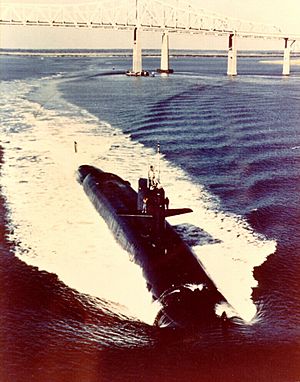USS Lewis and Clark (SSBN-644) facts for kids

USS Lewis and Clark (SSBN-644)
|
|
Quick facts for kids History |
|
|---|---|
| Name | USS Lewis and Clark |
| Namesake | Meriwether Lewis (1774–1809) and William Clark (1770–1838), who carried out the Lewis and Clark Expedition (1804–06) |
| Awarded | 1 November 1962 |
| Builder | Newport News Shipbuilding and Drydock Company |
| Laid down | 29 July 1963 |
| Launched | 21 November 1964 |
| Sponsored by | Mrs. M. F. Engman and Mrs. M. G. Sale |
| Commissioned | 22 December 1965 |
| Decommissioned | 27 June 1992 |
| Stricken | 1 August 1992 |
| Fate | Scrapping via Ship and Submarine Recycling Program began 1 October 1995; completed 23 September 1996; Sail and top of rudder preserved. |
| General characteristics | |
| Class and type | Benjamin Franklin class fleet ballistic missile submarine |
| Displacement |
|
| Length | 425 ft (130 m) |
| Beam | 33 ft (10 m) |
| Draft | 33 ft (10 m) |
| Installed power | 15,000 shp (11,185 kW) |
| Propulsion | One S5W pressurized-water nuclear reactor, two geared steam turbines, one shaft |
| Speed | Over 20 knots |
| Test depth | 1,300 feet (400 m) |
| Complement | Two crews (Blue Crew and Gold Crew) of 14 officers and 126 enlisted men each |
| Armament |
|
The USS Lewis and Clark (SSBN-644) was a special type of submarine called a ballistic missile submarine. It was the first ship in the United States Navy to be named after the famous explorers Meriwether Lewis and William Clark. These two explorers led the Lewis and Clark Expedition from 1804 to 1806.
Contents
Building the Submarine
The Navy decided to build the Lewis and Clark on November 1, 1962. Its main part, called the keel, was laid down on July 29, 1963. This happened at the Newport News Shipbuilding and Dry Dock Company in Newport News, Virginia.
The submarine was officially launched into the water on November 21, 1964. Mrs. M. F. Engman and Mrs. M. G. Sale were the sponsors for the ship. The Lewis and Clark was then put into service, or commissioned, on December 22, 1965. It had two teams of sailors, a Blue Crew and a Gold Crew. Commander John F. Fagan, Jr., led the Blue Crew, and Commander Kenneth A. Porter led the Gold Crew.
Life at Sea
After some testing and missile firing near Cape Canaveral, Florida, in 1966, the Lewis and Clark began its important patrols. Its job was to carry Polaris A3 ballistic missiles as a way to prevent wars. This is known as a deterrent patrol.
Missile Upgrades
On July 21, 1972, the submarine's missile tubes were changed. This allowed it to carry newer and more powerful Poseidon C3 ballistic missiles. Later that year, on December 18, 1972, the Gold Crew successfully launched one of these Poseidon C-3 missiles during a test.
The Lewis and Clark continued its important patrols. On April 8, 1973, it went out for another operational patrol.
Later Years and Tests
On June 19, 1981, the Lewis and Clark successfully fired four Poseidon C-3 missiles in a follow-up test. Soon after, on July 23, 1981, it went to Newport News Shipbuilding for a major check-up and to refuel its nuclear engine.
Years later, on June 13, 1985, the submarine again successfully launched four Poseidon C-3 missiles in another test.
End of Service
The Lewis and Clark was taken out of active service on October 1, 1991. It was officially decommissioned, meaning it was no longer part of the Navy, on June 27, 1992. Its name was removed from the Navy's list of ships on August 1, 1992.
The process of taking the submarine apart, called scrapping, began on October 1, 1995. This happened at Bremerton, Washington, as part of the U.S. Navy's Nuclear-Powered Ship and Submarine Recycling Program. The scrapping was finished on September 23, 1996.
Remembering the Submarine
Even though the submarine was taken apart, some parts of the Lewis and Clark were saved. Its sail (the tower on top) and the top of its rudder (for steering) are now on display. You can see them at the Patriots Point Naval and Maritime Museum in Mount Pleasant, South Carolina. These parts are part of a memorial that honors the brave officers and sailors of the U.S. Navy Submarine Service who served during the Cold War.
 | Tommie Smith |
 | Simone Manuel |
 | Shani Davis |
 | Simone Biles |
 | Alice Coachman |

